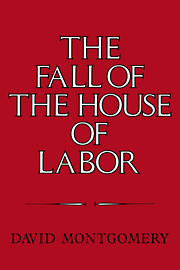Book contents
- Frontmatter
- Contents
- Acknowledgments
- Abbreviations used in text and notes
- Introduction
- 1 The manager's brain under the workman's cap
- 2 The common laborer
- 3 The operative
- 4 The art of cutting metals
- 5 White shirts and superior intelligence
- 6 “Our time … believes in change”
- 7 Patriots or paupers
- 8 “This great struggle for democracy”
- 9 “A maximum of publicity with a minimum of interference”
- Index
6 - “Our time … believes in change”
Published online by Cambridge University Press: 11 September 2009
- Frontmatter
- Contents
- Acknowledgments
- Abbreviations used in text and notes
- Introduction
- 1 The manager's brain under the workman's cap
- 2 The common laborer
- 3 The operative
- 4 The art of cutting metals
- 5 White shirts and superior intelligence
- 6 “Our time … believes in change”
- 7 Patriots or paupers
- 8 “This great struggle for democracy”
- 9 “A maximum of publicity with a minimum of interference”
- Index
Summary
The Chicago Civic Federation gathered representatives of those whom its secretary called the “solid, unselfish, humane, Christian, educated element of the nation” for two highly successful conferences as the nineteenth century drew to a close. One, held at Saratoga Springs in 1898, dealt with the future foreign policy of the United States as a world power. The second, convened in Chicago in 1899, dealt with the role of “combinations and trusts” in the emerging economic order.
Among the participants in the latter was M. M. Garland of Pittsburgh, who had left his heating furnace to assume the presidency of the Amalgamated Association of Iron, Steel and Tin Workers just as the Homestead strike was going down to defeat. His speech to the conference was optimistic but cautious. His hopes were based on the fact that with the return of prosperity, wages were rising and his union was growing again; it had even instituted a workday of three eight-hour turns for most of its remaining members in midwestern iron-rolling mills. He had left both the union office and the mills behind him when President McKinley had appointed him Pittsburgh's collector of customs. Addressing himself to the current wave of mergers in the business world, Garland declared that whether or not the nation “tolerated” trusts would depend on their behavior toward workers. Antitrust laws should be avoided, because the courts had applied them unhesitatingly against unions. The great peril was the “wanton” slashing of wages that steel companies had practiced during the depression years.
- Type
- Chapter
- Information
- The Fall of the House of LaborThe Workplace, the State, and American Labor Activism, 1865–1925, pp. 257 - 329Publisher: Cambridge University PressPrint publication year: 1987



